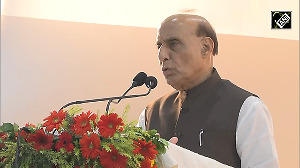American sprinter Jerome Young was named by the International Olympic Committee (IOC) as having failed a drug test before the 2000 Olympics and could lose the relay gold medal he won three years ago.
The IOC has handed the Young case back to the International Association of Athletics Federations (IAAF), the ruling body which has jurisdiction on doping matters in the sport outside the Olympic Games.
If the IAAF decides Young was ineligible to race in Sydney, the IOC will then decide what action to take, probably by the end of the year. IOC President Jacques Rogge said an athlete in such a case would "probably" be disqualified.
Young received a gold medal for the 4x400 metres relay in Sydney and won the 400 metres world title in Paris last month. Although Young did not compete in the Sydney relay finals, he ran in an early round and got a gold medal as a team member.
He was alleged by the Los Angeles Times last month to have failed a test for the steroid nandrolone before the Sydney Olympics. But he was cleared to compete by the U.S. Olympic Committee (USOC), who did not inform the IOC.
YOUNG NAMED
An IOC executive board meeting on Thursday was handed a letter by the USOC confirming Young had failed a drugs test. Previously, the USOC had declined to name the athlete involved in the positive test.
The USOC said this confirmation followed an admission by Young and a review of USOC records.
The USOC also handed over an independent review of its anti-doping policy from 1985 to 2000, which revealed "no evidence that the USOC covered up any doping case".
The report covers 24 positive tests involving unidentified U.S. athletes who had won Olympic medals, spelling out which prohibited substances they had tested positive for and what action had been taken.
Some, including nine-times Olympic champion Carl Lewis, were cleared since they had used prohibited substances inadvertently. Lewis tested positive for pseudoephedrine, ephedrine and phenylpropanolamine in 1988, a month before the Seoul Games.
Others had tested positive, been banned and then returned to competition, subsequently winning an Olympic medal.
"We want to dispel the notion that the USOC was involved in a conspiracy of silence and a cover-up," USOC acting secretary-general Jim Scherr told a news conference.
IAAF PROBE
In the case of the unidentified athlete, the review report reveals there was a 15-month "hiatus" at an IOC-accredited laboratory in Indianapolis between June 1999 and August 2000, a month before the start of the 2000 Games.
The IOC had said on Wednesday there was no legal means by which it could investigate the Young case and had asked the IAAF and the USOC to reconsider it.
Now the USOC has revealed Young's name the IAAF probe could be completed in days, said Arne Ljungqvist, chairman of its medical commission.
But first the IAAF has to receive the necessary documents from the ruling body of U.S. athletics, USA Track & Field (USTAF), which says it is bound by confidentiality laws.
The IAAF had brought the case of the "unidentified athlete" and 12 others to the Court of Arbitration for Sport, but CAS upheld the USTAF's right to withhold their names from the IAAF.
USTAF spokeswoman Jill Geer said on Thursday the U.S. ruling body would not confirm that the athlete in question was Young.
She also added: "We would like to make the documents available but we are bound by the CAS decision and our confidentiality laws that were in effect in 2000."
Ljungqvist had earlier said the USOC would "with all means" exercise pressure on the USTAF to deliver the documents, as would the IOC.
Ljungqvist also heads the IOC's medical commission, which will investigate the Young case again.
Rogge said he hoped the IOC could make a final decision on the Young case at the executive board meeting in early December.







